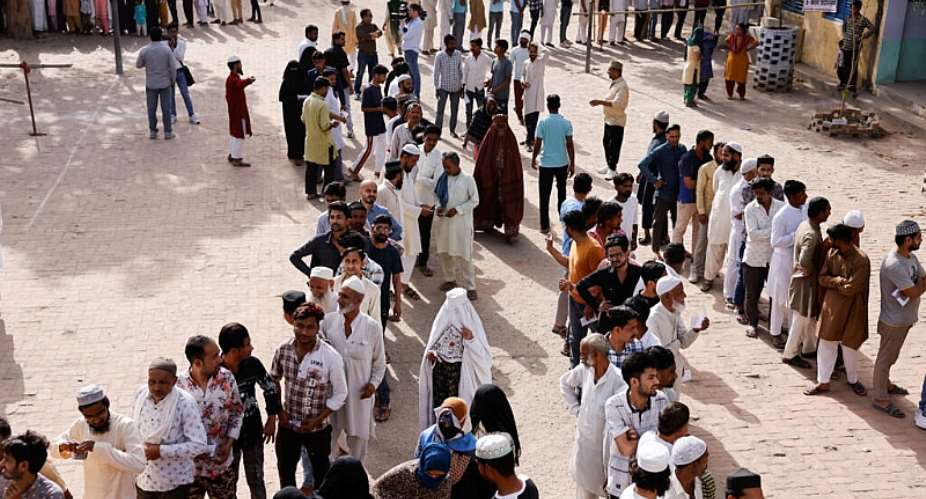Political parties are making lavish promises to millions of first-time voters as India kicks off a second round of polling in general elections that run from April to June.
Rivals are fighting bitterly over young electors, who were partly responsible for the victories won by Prime Minister Narendra Modi's Hindu nationalist Bharatiya Janata Party (BJP) in 2014 and 2019.
Around 20 million people are eligible to vote for the first time in this year's polls, which will elect 543 members of the Indian parliament.
Voting is taking place in phases, with 109 seats put to the ballot on 19 April and another 89 a week later.
Results are due on 4 June.
Disaffected voters
Modi's BJP and the opposition Congress are in a race to woo electors aged between 18 and 29 – the largest chunk of new voters enrolled.
But turnout was below average for the first round of voting, giving rise to worries of political cynicism spreading in the world's largest democracy.
According to Sanjay Kumar of the Centre for the Study of Developing Societies (CSDS) think tank, their research indicates Indians of all ages are angry over unemployment and high food prices.
“From our surveys we do get an impression that the attraction of the youth for the BJP – especially with regards to Prime Minister Modi – still remains, though there are concerns regards unemployment,” he told India Today.
The unemployment rate rose to 8 percent in 2023 from 7.5 percent the previous two years, according to the Centre for Monitoring Indian Economy (CMIE).
“This is an exceptionally high rate of unemployment... with the number of unemployed persons actively looking for employment touching nearly 37 million,” CMIE said.
Young people are hit hard, according to the International Labour Organisation's Indian Employment Report 2024, which said that one in three university graduates were jobless.
“Nearly 83 percent of those unemployed are young, and among these unemployed young Indians, nearly 66 percent are educated,” the report said.
Poll promises
When Modi came to power in 2014, his government promised to create some 20 million jobs a year over the following decade. By 2017, it had frozen the publication of annual employment surveys.
As the latest elections neared, the BJP again promised new jobs, as well as free housing for another 30 million people and food for 800 million of the poorest Indians.
Meanwhile the Congress guaranteed to open up 3 million vacancies in state utilities, a minimum wage of 400 rupees (around €4.50) per day and financial support for jobless graduates.
“We understand unemployment and its pain,” Congress leader Priyanka Gandhi said.
Analysts say 90 percent of Indians the equivalent of earn less than 281 euros a month and cannot pay rising tuition fees for engineering or medical schools.





 S.Africa building collapse kills one, traps dozens: police
S.Africa building collapse kills one, traps dozens: police
 Election 2024: I’m ready to serve Ghana with my heart, energies – Bawumia
Election 2024: I’m ready to serve Ghana with my heart, energies – Bawumia
 We saved Ghana $19million in 2020 elections – EC
We saved Ghana $19million in 2020 elections – EC
 Nobody has ever enticed me with money to rule in his or her favour — Otumfuo
Nobody has ever enticed me with money to rule in his or her favour — Otumfuo
 Limited voter registration: Dumsor will not affect registration, we've rented ge...
Limited voter registration: Dumsor will not affect registration, we've rented ge...
 Back Free SHS policy with legislative instrument to prevent successive govt from...
Back Free SHS policy with legislative instrument to prevent successive govt from...
 Dadieso LPG tanker accident: No live or property lost as speculated, product suc...
Dadieso LPG tanker accident: No live or property lost as speculated, product suc...
 EOCO to return docket on Cecilia Abena Dapaah to OSP over lack of evidence
EOCO to return docket on Cecilia Abena Dapaah to OSP over lack of evidence
 Police, youth clash at Dambai; teenager killed by stray bullet
Police, youth clash at Dambai; teenager killed by stray bullet
 Court convicts student for issuing GHC50,000 dud cheque
Court convicts student for issuing GHC50,000 dud cheque
